句子翻译正说反译反说正译
- 格式:pptx
- 大小:85.73 KB
- 文档页数:20

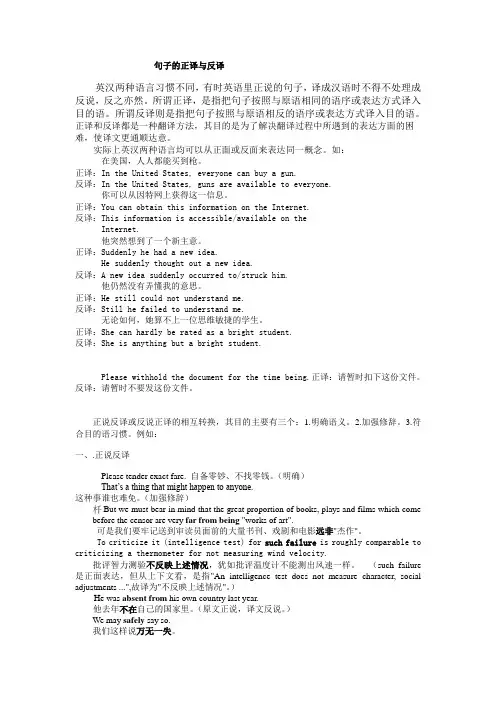
句子的正译与反译英汉两种语言习惯不同,有时英语里正说的句子,译成汉语时不得不处理成反说,反之亦然。
所谓正译,是指把句子按照与原语相同的语序或表达方式译入目的语。
所谓反译则是指把句子按照与原语相反的语序或表达方式译入目的语。
正译和反译都是一种翻译方法,其目的是为了解决翻译过程中所遇到的表达方面的困难,使译文更通顺达意。
实际上英汉两种语言均可以从正面或反面来表达同一概念。
如:在美国,人人都能买到枪。
正译:In the United States, everyone can buy a gun.反译:In the United States, guns are available to everyone.你可以从因特网上获得这一信息。
正译:You can obtain this information on the Internet.反译:This information is accessible/available on theInternet.他突然想到了一个新主意。
正译:Suddenly he had a new idea.He suddenly thought out a new idea.反译:A new idea suddenly occurred to/struck him.他仍然没有弄懂我的意思。
正译:He still could not understand me.反译:Still he failed to understand me.无论如何,她算不上一位思维敏捷的学生。
正译:She can hardly be rated as a bright student.反译:She is anything but a bright student.Please withhold the document for the time being.正译:请暂时扣下这份文件。
反译:请暂时不要发这份文件。
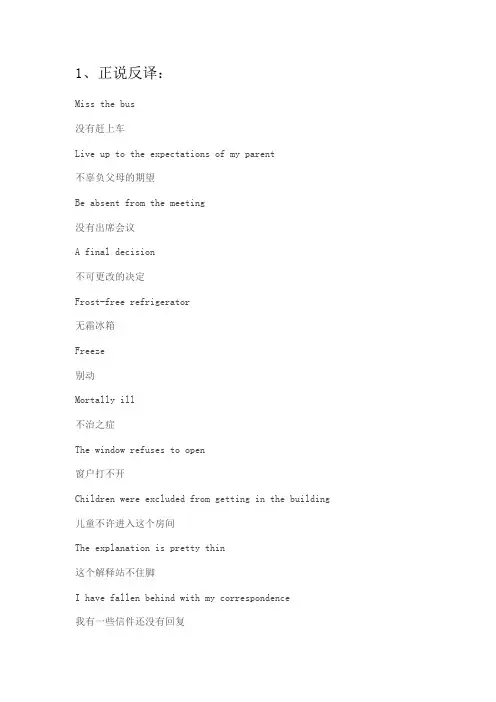
1、正说反译:Miss the bus没有赶上车Live up to the expectations of my parent不辜负父母的期望Be absent from the meeting没有出席会议A final decision不可更改的决定Frost-free refrigerator无霜冰箱Freeze别动Mortally ill不治之症The window refuses to open窗户打不开Children were excluded from getting in the building 儿童不许进入这个房间The explanation is pretty thin这个解释站不住脚I have fallen behind with my correspondence我有一些信件还没有回复Fully clothes, he fell across his bunk and was instantly sleep 衣服也不脱,他往床上横着一倒,不一会儿就睡着了Don’t lose time in posting this letter不要忘了寄这封信No deposit will be refunded unless ticket produced凭票退押金例1:原文:她忍住了没有笑出声。
译文:She refrained from laughing.例2:原文:花园根本无人整理。
译文:The garden was in a state of total neglect.例3:原文:我不能忍受你的脾气。
译文:Your temper is more than I can bear.例4:原文:他宁死不屈。
译文:He would die before yielding.例5:原文:生活远非净是乐事。
译文:Life is far from being a bed of roses.例6:原文:风景美得无以言表。
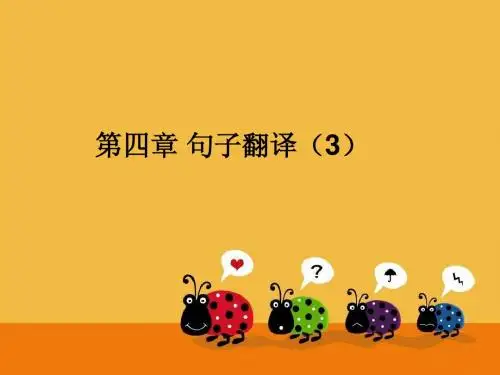
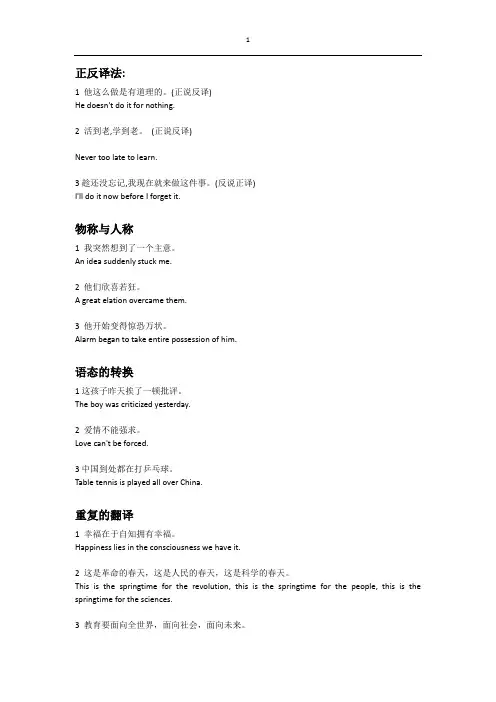
正反译法:1 他这么做是有道理的。
(正说反译)He doesn't do it for nothing.2 活到老,学到老。
(正说反译)Never too late to learn.3趁还没忘记,我现在就来做这件事。
(反说正译)I'll do it now before I forget it.物称与人称1 我突然想到了一个主意。
An idea suddenly stuck me.2 他们欣喜若狂。
A great elation overcame them.3 他开始变得惊恐万状。
Alarm began to take entire possession of him.语态的转换1这孩子昨天挨了一顿批评。
The boy was criticized yesterday.2 爱情不能强求。
Love can't be forced.3中国到处都在打乒乓球。
Table tennis is played all over China.重复的翻译1 幸福在于自知拥有幸福。
Happiness lies in the consciousness we have it.2 这是革命的春天,这是人民的春天,这是科学的春天。
This is the springtime for the revolution, this is the springtime for the people, this is the springtime for the sciences.3 教育要面向全世界,面向社会,面向未来。
Education must be geared to the needs of the world, the society and the future.外位语翻译1 从各个方面考虑,我们认为这是个好的计划。
All things considered, it is a good plan.2你的朋友们会说什么呢?Your friend, what will they say?3那只猫吃了那只老鼠,连皮带骨都吃了。
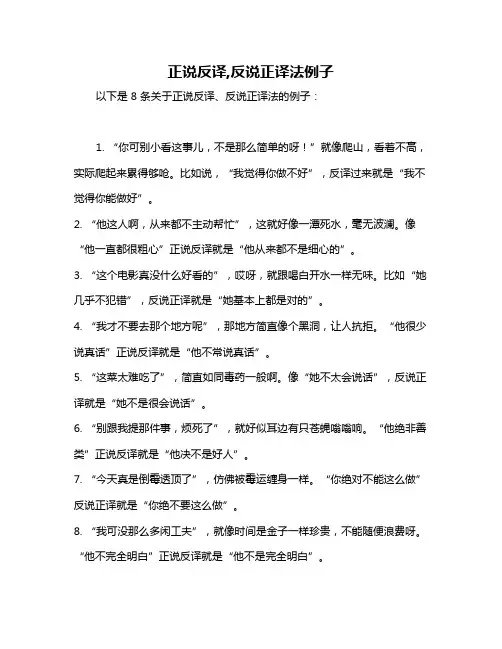
正说反译,反说正译法例子
以下是 8 条关于正说反译、反说正译法的例子:
1. “你可别小看这事儿,不是那么简单的呀!”就像爬山,看着不高,实际爬起来累得够呛。
比如说,“我觉得你做不好”,反译过来就是“我不觉得你能做好”。
2. “他这人啊,从来都不主动帮忙”,这就好像一潭死水,毫无波澜。
像“他一直都很粗心”正说反译就是“他从来都不是细心的”。
3. “这个电影真没什么好看的”,哎呀,就跟喝白开水一样无味。
比如“她几乎不犯错”,反说正译就是“她基本上都是对的”。
4. “我才不要去那个地方呢”,那地方简直像个黑洞,让人抗拒。
“他很少说真话”正说反译就是“他不常说真话”。
5. “这菜太难吃了”,简直如同毒药一般啊。
像“她不太会说话”,反说正译就是“她不是很会说话”。
6. “别跟我提那件事,烦死了”,就好似耳边有只苍蝇嗡嗡响。
“他绝非善类”正说反译就是“他决不是好人”。
7. “今天真是倒霉透顶了”,仿佛被霉运缠身一样。
“你绝对不能这么做”反说正译就是“你绝不要这么做”。
8. “我可没那么多闲工夫”,就像时间是金子一样珍贵,不能随便浪费呀。
“他不完全明白”正说反译就是“他不是完全明白”。
我觉得这种翻译方法很有趣,能让我们更灵活地理解和运用语言,有时候能更加准确地表达出我们的意思呢!。
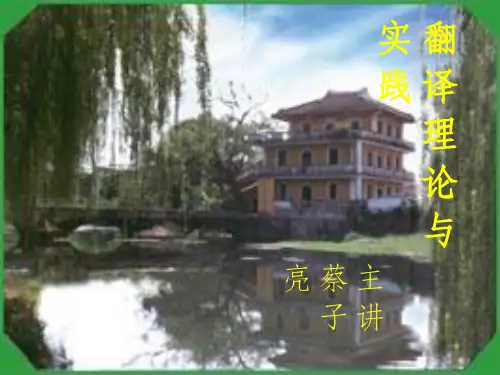

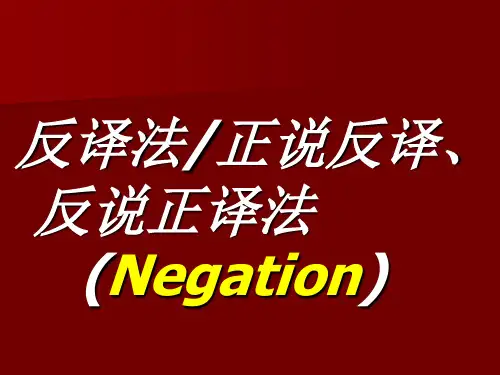
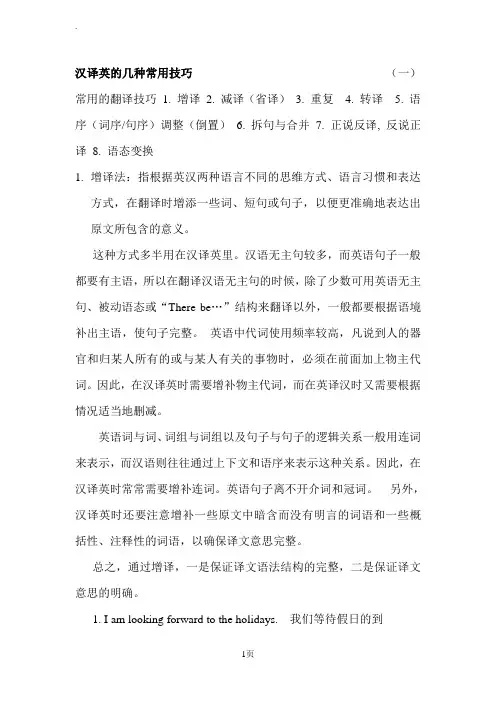
汉译英的几种常用技巧(一)常用的翻译技巧1. 增译2. 减译(省译)3. 重复 4. 转译 5. 语序(词序/句序)调整(倒置) 6. 拆句与合并7. 正说反译, 反说正译8. 语态变换1.增译法:指根据英汉两种语言不同的思维方式、语言习惯和表达方式,在翻译时增添一些词、短句或句子,以便更准确地表达出原文所包含的意义。
这种方式多半用在汉译英里。
汉语无主句较多,而英语句子一般都要有主语,所以在翻译汉语无主句的时候,除了少数可用英语无主句、被动语态或“There be…”结构来翻译以外,一般都要根据语境补出主语,使句子完整。
英语中代词使用频率较高,凡说到人的器官和归某人所有的或与某人有关的事物时,必须在前面加上物主代词。
因此,在汉译英时需要增补物主代词,而在英译汉时又需要根据情况适当地删减。
英语词与词、词组与词组以及句子与句子的逻辑关系一般用连词来表示,而汉语则往往通过上下文和语序来表示这种关系。
因此,在汉译英时常常需要增补连词。
英语句子离不开介词和冠词。
另外,汉译英时还要注意增补一些原文中暗含而没有明言的词语和一些概括性、注释性的词语,以确保译文意思完整。
总之,通过增译,一是保证译文语法结构的完整,二是保证译文意思的明确。
1. I am looking forward to the holidays. 我们等待假日的到2.Much of our morality is customary. 我们大部分的道德观念都有习惯性。
3.Reading makes a full man; conference a ready man; and writing an exact man.读书使人充实,讨论使人机智,笔记使人精确。
4.Histories make men wise; poets witty; the mathematics subtle; natural philosophy deep; moral grave; logic and rhetoric able to contend. 读史使人明智,读诗使人灵秀,数学使人周密,科学使人深刻,伦理使人庄重,逻辑修辞之学使人善辩。
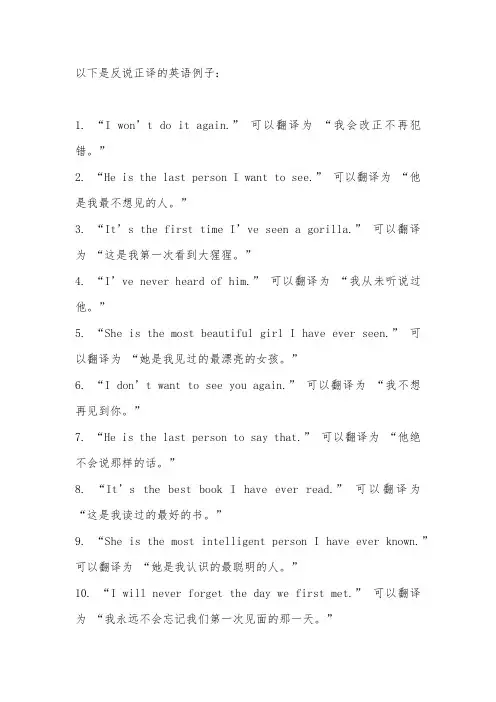
以下是反说正译的英语例子:
1. “I won’t do it again.” 可以翻译为“我会改正不再犯错。
”
2. “He is the last person I want to see.” 可以翻译为“他
是我最不想见的人。
”
3. “It’s the first time I’ve seen a gorilla.” 可以翻译
为“这是我第一次看到大猩猩。
”
4. “I’ve never heard of him.” 可以翻译为“我从未听说过他。
”
5. “She is the most beautiful girl I have ever seen.” 可
以翻译为“她是我见过的最漂亮的女孩。
”
6. “I don’t want to see you again.” 可以翻译为“我不想
再见到你。
”
7. “He is the last person to say that.” 可以翻译为“他绝
不会说那样的话。
”
8. “It’s the best book I have ever read.” 可以翻译为“这是我读过的最好的书。
”
9. “She is the most intelligent person I have ever known.” 可以翻译为“她是我认识的最聪明的人。
”
10. “I will never forget the day we first met.” 可以翻译
为“我永远不会忘记我们第一次见面的那一天。
”
希望以上内容对您有所帮助。
第八章英翻译技巧(五)正说反译反说正译正说反译、反说正译的应用不论是正说反译还是反说正译,究其原因归纳起来主要是:保证语义明确、加强修饰效果、尊重汉语习惯,保证译文通畅易懂。
所谓反面表达,是指英语词句中含有“not”,“never”,“no”,“un-”,“im-”,“ir-”,“in-”,“less-”等否定成分,汉语词句中含有“不”、“没”、“无”、“未”、“甭”、“别”、“休”、“莫”、“毋”、“勿”、“非”等否定成份,不含这些成份的为正面表达。
(一)正说反译的应用1.谓语动词或动词词组本身表示否定意义,常见的有:Fail, fizzle out, fall short, be frustrated, escape, elude, slip away, stop, cease, overlook, ignore, neglect, refuse, grudge(怨恨,不情愿做), disdain, reject, turn down, forbid, prohibit, exclude from, bar, ban, expire, be blind to, deny, avoid, omit, forget, prevent from, live up to, resist, miss, lack. I missed what you have said because of the noise outside.由于外面的噪音,我没听清楚你说的话。
To our disappointment, he failed to take the overall situation into account. 使我们失望的是他不顾大局。
Such a chance was denied to me.我没有得到这样一个机会。
2.介词或介词短语含否定之意,常见的词有:Above, against, below, beneath, beyond, instead of, out of, without, but for。
五、正反、反正译法英语句子中含有no, not, never, 等否定词,或者含有non-, im-, in-, ir-. -less等等否定性词缀的词语就是反说,不含这些词语的就是正说。
汉语句子中如果含有“不”、“没有”、“无”、“未”、“莫”、“甭”、“休”、“非”、“毋”、“勿”等否定意义的词汇,就是反说,反之则为正说。
A.No smoking! (反说)严禁吸烟!(正说B. B. Wet Paint! (正说)油漆未干!(反说)(1) I don’t think we’ll fail in our exam.(我认为我们考试不会不及格。
——会及格)(2) Calm down, please.(你可不要激动!)(3) There is not a second that I don’t miss you.(没有一秒钟我是不挂念你的.=我时刻挂念着你.)正说反译:(一)英语中很多词本身就含有否定意义,beyond, absent, stop, bad, avoid, exclude, except, doubt, resistant, refuse, few, little, 这类词在翻译中要译出它的含有的否定意义。
The window refuses to open.窗户打不开。
Children were excluded from getting in the building.孩子不许进入这幢楼房。
Such a chance denied me.我没有得到这个机会。
The explanation is pretty thin.这个解释站不住脚。
(二)有些正反译法可以增强修辞效果,但使用的时候需要非常慎重。
Sir William and Lady Lucas are determined to go, merely on that account, for in general you know they visit no new comers.卢卡斯爵士夫妇打定主意要去,还不就是为了这个缘故,因为你知道,他们通常是不去拜访新搬来的邻居的。
正说反译与反说正译英语和汉语有相同之处,那就是在表达同一事物或同一概念时,往往可以从正面叙述,也可以从反面叙述。
比如我们可以说“很困难”(quite difficult),也可以改成“很不容易”(far from easy);说做某事“竭尽全力”(do one’s best),也可以说“不遗余力”(spare no effect);可以说某个学生成绩“还好”(good),也可以说“不错”(not bad)。
但由于思维方式的不同,英语中有些从正面表达的东西在汉语中习惯从反面表达;而有些从反面来表达的东西在汉语中则习惯从正面来表达。
因此,英译汉时常常有必要进行转换。
这就是通常所说的“正说反译与反说正译”法。
如英语中的“wet Paint!”,汉语中常说成“油漆未干”,英语中说“I won’t keep you waiting long ”汉语中却说“我一会而就回来。
”1、正说反译:Miss the bus没有赶上车Live up to the expectations of my parent不辜负父母的期望Be absent from the meeting没有出席会议A final decision不可更改的决定Frost-free refrigerator无霜冰箱Freeze别动Mortally ill不治之症The window refuses to open窗户打不开The explanation is pretty thin这个解释站不住脚Beauty is but skin deep.美丽但不肤浅。
Opportunity knocks but once.机会只来一次。
Keep upright切勿倒置。
Agreeable sweetness甜而不腻。
I doubt it我不相信。
Mind your steep当心脚下。
2、反说正译:The specification lacks detail.说明书不够详细。
(1) It was not long before he died.译文过了不久,他就死了。
(2) It has been one year since I last smoked.译文一年前,我戒了烟。
/ 我戒烟已经一年了。
(3) This is well out of the line of traffic and it was three years before any ship sighted the castaways.译文这里远离航线,过了三年,过往船只才发现这群流落荒岛的人。
(4) You have to ask for his consultation before you make any decision.必须咨询他之后才能做出决定。
/做决定前,一定要咨询他的意见。
(1) Office area, staff only.译文办公区域,闲人免进。
(2) The villagers found themselves vulnerable(['vʌln(ə)rəb(ə)l]易受攻击的)to the process of industrialization.译文村民们发现自己无力抵挡工业化的进程。
(3) This problem is quite above me.译文这个问题难住了我。
/ 这个问题我不懂。
(1) By the time I reached Stanislau, all the people were gone, too.我抵达斯丹尼斯劳时,此地已经成为空城了。
(2) The new century is upon us.我们即将迎来新世纪。
(3)After three sips it was gone, but I could still feel its warmth and energy. 我啜吸三口就喝光了,不过咖啡的香浓温暖我却至今难忘。
(4)Being a writer had been far from my expectations; being a best-selling author was almost unfathomable(深不可测的;无底的;莫测高深的).我根本没有料到过自己能成为一名作家,更不敢想象自己能成为一位畅销书作者。